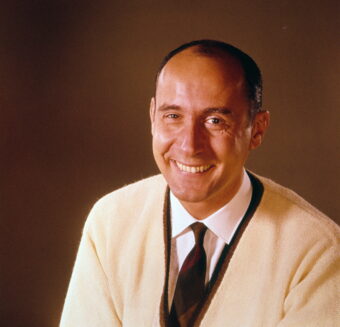At the onset of the ’90s, major labels didn’t consider the Screaming Trees an especially attractive prospect — literally. “I recall getting in an argument with a superior who was saying, ‘Look at the two fat guys in the group. How could that be successful?'” recalls Bob Pfeifer, who was an A&R executive at Epic Records. The “fat guys” in question were guitarist Gary Lee Conner and his younger brother, bassist Van Conner, who cofounded the psych-rock Trees with brooding baritone Mark Lanegan and drummer Mark Pickerel in their rural hometown of Ellensburg, Washington, in 1985. Pfeifer ultimately prevailed, signing the Trees in 1990. And it took only two years for the band to prove themselves a commercial success when they scored their biggest hit, “Nearly Lost You,” a triumphant, yearning rocker powered by new drummer Barrett Martin.
Of course, the Trees were helped in no small part by the phenomenal success of Seattle scene buddies Nirvana. “When we first signed, they didn’t know what to do with us,” says Van Conner. “We were in the Epic Records heavy metal department. We were on a compilation called something like Blazing Metal, with bands like Winger. They learned from Nirvana how to promote us.” Filmmaker Cameron Crowe benefitted too — his now-iconic Seattle-based rom-com Singles had been finished for a year, but he credits the success of the Seattle sound with actually getting the film released in 1992. Conversely, the Trees’ “Nearly Lost You,” recorded for their second Epic album, Sweet Oblivion, was an 11th-hour addition to the grunge-heavy Singles soundtrack (released months before the movie), which eventually went platinum, helped by the breakout of “Nearly Lost You.”
The Trees’ video for the track — coinciding with the September release of Sweet Oblivion and cinematic release of Singles — became an MTV Buzz Clip. The song peaked at No. 5 on the Billboard Modern Rock Tracks chart, and Sweet Oblivion went on to sell more than 400,000 copies, the Trees’ best sales performance in their 15-year history. A momentum-killing four years — marked by a scrapped album, intra-band tensions and substance-abuse issues — passed before the Trees released their follow-up, Dust. The group ultimately disbanded in 2000. Though the Trees may not have survived the last 20 years, “Nearly Lost You” certainly did — although there’s at least one Tree who hopes to never, ever hear it again.
What do you remember about writing “Nearly Lost You”?
VAN CONNER, BASSIST: I had a little house in Ellensburg, and I decided not to pay rent that month to buy a four-track. I think it was the summer before we recorded Sweet Oblivion. The first time I used the four-track, I started writing that song [on guitar] — a chorus and pretty much the main part. It’s basically about being on acid and how you can lose control of your mind. I stopped using drugs a long time ago, but there’s this place you get, if you do the right kind or the wrong kind or too much, where you really feel like you know what an insane person feels like — where you see demons and hell and just fucking crazy shit. Basically, I was referring to that point where you’ve gone too far and then you make it back somehow.
MARK LANEGAN, VOCALIST: Our bass player gave me these tapes, which were sort of tough to listen to, and somewhere in the midst of one of them there was about a minute of this riff that sounded different than anything we had. We just wrote it from that riff, specifically to write a single. I’m fairly certain that it was because our A&R guy said, “This is good stuff, but we don’t have a single yet.”
The final version of the song sounds like it’s about a relationship. How did the words come together?
LANEGAN: The chorus, “I nearly lost you,” was something [Van] sang on the original demo, if you will. The verses — uh, you gotta say something. Is it about a relationship? Uh. [Laughs] If you say so, that’s cool with me.
CONNER: It could be mistaken for a love song. But [the lyric], “There’s a rider that’s fallen / And it’s clear there’s no time to return” — a lot of the old Trees songs were, like, you’re on a journey and you have to struggle to get there, but somehow you make it anyway. It could mean anything to anybody. If the song was literal, it would probably be boring — if it was just about some girl.
LANEGAN: Making that record was just a total blur for me. I recall there was a lot of drinking going on.
CONNER: We did two rehearsals before going into the studio in New York. “Nearly Lost You” was done in one or two takes — it just kind of happened. It was a wild time for the band. We were basically running around, raising mayhem, using the record label’s limo vouchers like they were going out of style.
What do you recall about making the video?
CONNER: Mark came up with an idea that was very unlike Mark. He said, “Hey, let’s shoot it at the Ellensburg Rodeo ground.” I thought he was kidding. They booked the rodeo ground, and it was, like, 100 degrees in the dirt. I thought it was a pretty good video. I think we all look like we’re in a shampoo commercial, though, since we’re in slow motion with our hair flowing. And they didn’t try too hard to hide our robust figures, which they usually tried to do in our videos.
LANEGAN: It was embarrassing. I had to be fairly intoxicated to get it done. Watched it once, made it a point to never see it again. The thought of it still — well, if I wasn’t almost 50 years old — would probably make me cringe. But I’ve gotten over it.
ERIC ZIMMERMAN, VIDEO DIRECTOR: There was one requirement we were given, which was we had to put the Singles poster in the video. This was at the grunge time, which wasn’t about product placement. So I was like, “Well, let’s burn the poster in the video — that would be rock’n’roll.” So we burned the poster. A rough cut had come out, and I had to field a special call from Cameron Crowe’s office: He didn’t want the poster burned in the video, because it was disrespectful. I was kind of like, Well, yeah, that’s the point. I had to think fast, so I said, “We’ll run the footage backwards,” so it looked like the poster was burning backwards. That was a minor concession. In today’s world, they would have made me take it out.
CAMERON CROWE, DIRECTOR, SINGLES: Everybody always played their stuff — we did while making the movie — so it was a natural. The song “Nearly Lost You” already existed and seemed like a perfect fit. The birth of that album was really a mixtape of new stuff from the bands we knew, combined with regional favorites — with Westerberg serving as a visiting statesman — proving that the best stuff always happens when it’s the most personal. The Screaming Trees were a big part of the whole feel, then and now. “Nearly Lost You” was a perfect bridge from great rock as we knew it pre-Seattle, and a perfect representation of the super-committed new direction music was taking. Like “Man in the Box,” it’s one of those important records that show the rise of the Northwest in the early ’90s wasn’t just about Cobain and Vedder. I only wish we’d had room for Tad and Truly on the soundtrack too!
CONNER: During the movie, our song is so quiet it’s almost unnoticeable. It’s during a scene where they find out if the girl [Kyra Sedgwick’s character] is gonna have a baby or not. We thought the movie was gonna be about all the bands in Seattle, and it ended up being about singles and relationships, and it just happened to take place in Seattle in that time period. Matt Dillon with the hair — it’s pretty funny now, looking back. But I’m really happy we were in it, because I got a platinum record on my wall for it.
LANEGAN: I’ve been flipping through the channels once or twice and come across a scene and realized when I saw Matt Dillon with long hair that it was that movie, but I never have watched it.
When did you realize that “Nearly Lost You” was going to be a hit?
CONNER: We were playing a show with Mojo Nixon and fIREHOSE in Florida, and our manager, Kim, was like, “Wow, your album is actually selling this much a week” — it was a lot — “and your song is being played on the radio this much.” You could turn on MTV and see our video if you just watched for an hour. Either Mark or Lee said, “Wow, maybe we’ll be a one-hit wonder.” And then, 15 years later, VH1 did a show called One-Hit Wonders, and we were on it.
LANEGAN: I wasn’t really aware that it was a hit. It had some minor success. When I think of a hit, I think of Madonna.
“Nearly Lost You” is available for Rock Band, featured on the Guitar Hero 5 soundtrack, and on the 2007 baseball game The Bigs. How does it feel to be immortalized in a video game?
CONNER: I didn’t know it was on a baseball game. Where’s my check? I have a 14-year-old kid. None of [his classmates] have any idea about my band, but he came home from school one day and said, “Hey, Dad, one of my friends said he heard your music” on Xbox or Rock Band. Did it give my son any cred at school? He seems like he doesn’t give a crap. My kids don’t think I’m cool.
Where is the oddest place you’ve heard the song?
CONNER: Some network, I think it was an MTV newscast, kept looping Barrett’s drum part — that boot-a-boot-a-boot part — while Clinton was giving a speech, maybe his second inaugural. I was like, “This is crazy.” They play it in the Northwest still as an intro to football games, like the Seahawks. I think I heard [a snippet] on Rush Limbaugh’s radio show. I still get pleasantly surprised when I hear it.
CROWE: “Nearly Lost You” holds up beautifully; it still pops up on the radio and takes full command whenever I hear it.
LANEGAN: It’s one of those songs I hope to never hear again. Why? Because it was specifically written to be a single. It’s a corny, cheesy tune. But, you know, whatever. It is what it is.
Do you find audiences requesting “Nearly Lost You” at shows you play these days?
CONNER: I’ve had people ask me why we don’t play Screaming Trees in [my current band] Valis. We do occasionally, but that one is too obvious. It’s usually an obscure, weird one.
LANEGAN: No. Luckily they have better taste than that.
Mark Yarm is the author of Everybody Loves Our Town: An Oral History of Grunge. Additional reporting by Kory Grow.





